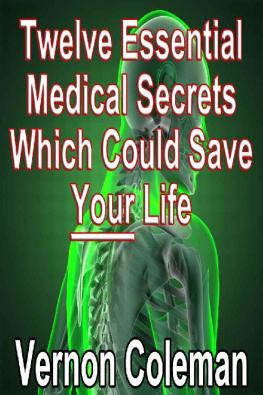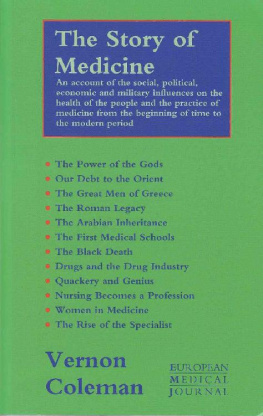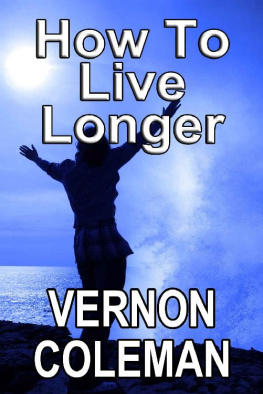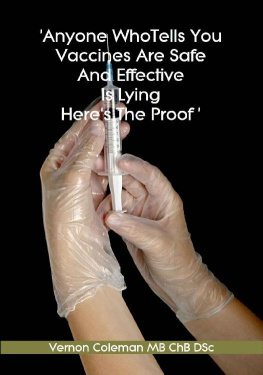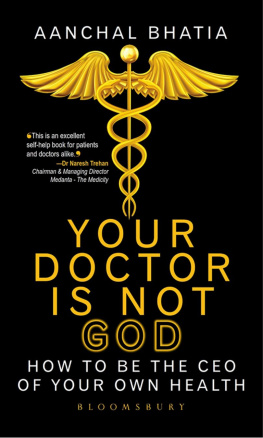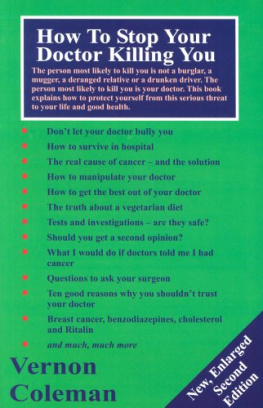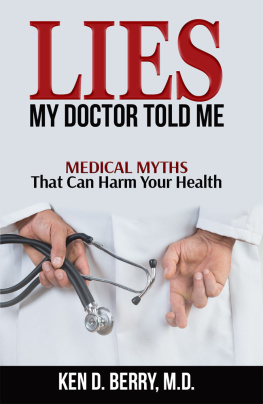Preface
We all want to trust our doctor. We want to believe that wecan trust him or her because life is so much easier that way. We want tobelieve that if we fall ill there will be someone honest, honourable,intelligent, wise, caring and compassionate to whom we can turn. If things areotherwise then we would prefer not to know.
But things have changed in the last few years.Outside influences (from drug companies, politicians and lawmakers) mean thatthese days very few of us can trust our doctor; not, at least, in thatall-trusting way people used to trust their doctors. Trusting your doctor canbe hazardous to your health.
Things have changed quite rapidly.
When I first wrote my book How To Stop YourDoctor Killing You in the mid 1990s the book proved popular with somereaders but attracted a good deal of disapproval from others. Many peopleacknowledged that there might be some bad doctors around but believed that mostdoctors were good and that their doctor was certainly one of the goodones. That has changed. When, in 2003, I published a second and larger editionof How To Stop Your Doctor Killing You readers leapt on the book withmuch greater enthusiasm and, it has to be said, with some apparent relief.
Today, things are getting worse at a frighteningrate.
The majority of doctors and nurses seem to haveforgotten why they were trained and why they are paid. Passion and purpose havedisappeared as the healing professions have become part of an industry;obsessed by the need to make a profit and unconcerned with such unprofitableconcepts as ethics and caring.
I suspect that all readers of this book make someeffort to ensure that the tyres on their cars have plenty of tread and thattheir brakes are in good, working condition. Everyone knows that motorcars cankill, and so sensible individuals do what they can to protect themselves.
And yet many more people die each year as a resultof medical accidents than die as a result of road accidents.
Put another way, this means that your doctor is farmore likely to kill you than your car. Not knowing how to protect yourself frompoor medical decisions is far more dangerous than driving around in a poorlymaintained motorcar.
The underlying problem is that even good, kind,conscientious doctors doctors who are honest and honourable, who care abouttheir work and who do their very best for their patients can still makepeople ill. And can still kill.
Many (though by no means all) of the problemscaused by doctors are a result of prescription drug consumption. When he writesout a prescription your doctor has to rely upon the honesty and integrity ofthe drug company making the product he is prescribing. And since most drugcompanies do not operate in an honest way that is a fundamental error of trustwhich can lead to many problems. You suffer from your doctors trust in thedrug company.
These days medicine is so complex, and drugs sopowerful, that you dont have to be an evil doctor to be a bad doctor.
To that you must add the fact that all patients areindividual and different. A drug which has proved effective and safe when givento 99 or 999 patients may still prove dangerous and deadly when given to the100th or the 1000th patient.
Every patient who takes a drug even a well-trieddrug is participating in an experiment. Most doctors either do not understandthis or they forget it in the heat of daily practice. And, of course,prescribing drugs is just one of the things doctors do.
The bottom line is that however good your doctor is and however much you may trust him or her you must share the responsibilityfor your own health and you must know when to tell your doctor if you thinkthat the treatment with which he or she is providing you could be causingproblems.
* * *
Things arent going to get any better. Indeed, myview is that everything will continue to get worse. Medicine is complex, andbecoming ever more complex by the day. Medical students and young nurses arebeing taught within an environment which is geared towards defending the systemand protecting drug companies. Responsibility has been separated fromauthority. In many hospitals patients are regarded (if they are regarded atall) as a nuisance.
Things will only change for the better whenpatients, and the honest professionals who do care, are prepared to stand upand make their voices heard.
Tell your friends, neighbours and colleagues whatyou read in this book. Share what you have learnt. Things dont have to be asbad as they are. But we are the only people who can make a difference. Reasonablemen adapt themselves to the world around them. Unreasonable men try to adaptthe world to themselves. So all progress depends on unreasonable men. Let usall be unreasonable.
* * *
I have built this book around twelve basic laws ofmedicine which I have, over the years, formulated for my own benefit, as adoctor, an author, a concerned relative and a patient. I have illustrated thetwelve laws with clinical anecdotes and scientific data.
My twelve laws are designed to help you make surethat you get the best out of your doctor (and every other doctor who treatsyou) and to minimise your chances of being made ill by a doctor.
VernonColeman August 2006
Authors Boring But Important Notes
1. This book is not intended to be, and cannot be, analternative to personal, professional medical advice. Readers shouldimmediately consult a trained and properly qualified health professional, whomthey trust and respect, for advice about any symptom or health problem whichrequires diagnosis, treatment or any kind of medical attention. Readers shouldalways consult a qualified doctor before changing or stopping medication,before changing their diet or before beginning any exercise programme. Whilethe advice and information in this book are believed to be accurate at the timeof writing, neither the author nor the publisher can accept any legalresponsibility or liability for errors or omissions which may have been made.
2. Many authors of medical books try to makethemselves (and their books) look well-informed by padding out their work withpages and pages of references. My books do not contain scientific references.There is a very good reason for this. If I listed all the references Ive usedin researching and writing this book the reference section would be as long asthe text, there would be twice as many pages and the book would cost twice asmuch to print and distribute. My guarantee that the material in this book iswell-founded is built upon my credibility as an author. If my readers find thatIve made stuff up, or made mistakes, then no one will buy my next book. Thisis what I do for a living and its in my professional and financial interest tomake sure its accurate.

